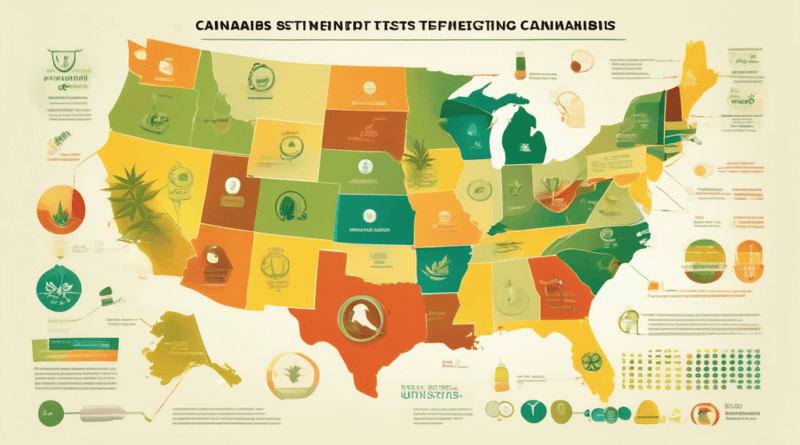Cannabis Testing Requirements: A State-by-State Overview
As the legalization of cannabis continues to expand across the United States, so does the need for rigorous testing standards to ensure the safety and quality of cannabis products. Each state with legalized cannabis markets has developed its own set of testing requirements, which can vary widely. This article provides a comprehensive overview of cannabis testing requirements on a state-by-state basis, highlighting the key aspects that stakeholders need to be aware of.
California
California’s cannabis testing regulations are among the most stringent in the country. The state mandates testing for a wide array of contaminants, including pesticides, residual solvents, heavy metals, microbial impurities, mycotoxins, and moisture content. The state also requires potency testing to confirm the levels of THC and CBD. Testing must be conducted by third-party laboratories that are accredited by the California Bureau of Cannabis Control (BCC).
Colorado
Colorado, one of the pioneers in cannabis legalization, has implemented thorough testing standards to ensure product safety. Requirements include testing for potency, microbial contaminants, pesticides, residual solvents, and mycotoxins. Colorado also mandates random sampling of products rather than allowing manufacturers to select their own samples, adding an extra layer of reliability to the testing process.
Washington
Washington state requires cannabis products to undergo testing for microbial contaminants, mycotoxins, moisture content, potency, residual solvents, and heavy metals. The state’s Liquor and Cannabis Board (LCB) oversees the accreditation of testing laboratories. Washington also has specific guidelines for the frequency and method of sampling, ensuring that products on the market meet safety standards.
Oregon
Oregon has implemented comprehensive testing requirements that cover potency, pesticides, residual solvents, microbiological contaminants, and water activity. The Oregon Liquor Control Commission (OLCC) is responsible for regulating cannabis testing and accrediting laboratories. The state also requires that different forms of cannabis products (e.g., flower, oil, edibles) undergo specific types of testing tailored to their unique properties.
Nevada
Nevada’s cannabis testing regulations are overseen by the Nevada Department of Taxation. The state mandates testing for potency, moisture content, microbial contaminants, residual solvents, heavy metals, and pesticides. One unique aspect of Nevada’s approach is the requirement for laboratories to participate in proficiency testing programs, periodically testing their accuracy against known standards.
Massachusetts
Massachusetts requires cannabis products to be tested for potency, residual solvents, pesticides, mycotoxins, heavy metals, and microorganisms. The state’s Cannabis Control Commission (CCC) oversees the regulation of testing laboratories. Massachusetts places a strong emphasis on transparency, requiring detailed labeling of all test results on product packaging.
Michigan
In Michigan, cannabis testing is mandated to cover potency, residual solvents, microbial contaminants, pesticides, mycotoxins, heavy metals, and foreign matter. The state’s Marijuana Regulatory Agency (MRA) is responsible for accrediting laboratories and ensuring compliance with testing standards. Michigan also utilizes a seed-to-sale tracking system to monitor the life cycle of cannabis products, from cultivation to testing and sale.
Florida
Florida has established testing requirements for potency, microbial contaminants, mycotoxins, residual solvents, pesticides, and heavy metals. The Office of Medical Marijuana Use (OMMU) regulates testing laboratories and enforces compliance. Florida’s regulations also specify standardized testing methods to ensure consistency and reliability across different laboratories.
Arizona
Arizona’s testing regulations include standards for potency, residual solvents, microbial contaminants, pesticides, mycotoxins, and heavy metals. The Arizona Department of Health Services (ADHS) oversees the accreditation and regulation of cannabis testing laboratories. Arizona also mandates that test results be publicly accessible, enhancing transparency for consumers.
Conclusion
The landscape of cannabis testing requirements is complex and varies significantly from state to state. Ensuring compliance necessitates staying informed about the specific regulations in each jurisdiction. As the industry evolves, standardization of testing protocols may become a focal point to ensure uniform safety and quality across state lines. For now, stakeholders must navigate each state’s unique regulatory framework to provide consumers with safe and reliable cannabis products.

